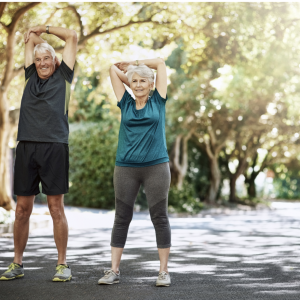New South Wales – especially Greater Sydney – is fast approaching 12 weeks in lockdown, and our friends in Melbourne are not far behind! Lockdowns can be mentally exhausting, and even the most disciplined of us can find bad habits start to creep in as the days start to blend into each other and our usual routine disappears.
Luckily, a return to normalcy seems to be approaching sooner rather than later, and it will soon be time to get back to our routine! One of the things we find happens most when we see clients for assessments post-lockdown is the loss of strength, and especially the loss of balance, that can happen in even the most disciplined.
Returning to a structured exercise routine after 3+ months of walking around the block can be daunting. The idea of gyms reopening had me excited but also lamenting the strength gains I may have lost during this period. So how can we ensure our return to structured exercise – whether in a public gym, a dedicated senior’s clinic, or in the comfort of your living room – is efficient, smooth, and sustainable?
- SM.A.R.T goals are THE goal
S.M.A.R.T goals are used extensively in healthcare settings, and they are incredibly easy to understand and implement to every day life. The acronym S.M.A.R.T stands for:
Specific
Measurable
Achievable
Realistic
Time-specific
Using S.M.A.R.T goals allows us to break our goals down into more digestible portions, so we don’t get overwhelmed! This way, we can also have a look back at our goals and see where any changes need to be made.
A goal of ‘I want to start running every day’ is not a very good S.M.A.R.T goal, especially if you have been in lockdown for 3 months and were not much of a runner to begin with. You would want to break this goal down using the S.M.A.R.T principles above. An example would be ‘I will aim to walk 3-5km every day, and at least 1km of that will be a jog/run. In 2-3 weeks, I will run 2km of that…’ and so on. Of course this approach may not work for everyone, and there are some highly motivated individuals among us who can just take off running the minute they leave their house.
- Hold yourself accountable and maintain it!
One of the best exercise decisions I made was to join a Pilates and Yoga studio with my best friend. If one of us feels the urge to cancel class and go the Netflix route, the other is there to get us back on track! Being held accountable can really improve the development of healthy habits!
Some great ways to make sure you not only start a healthy exercise habit, but also maintain it, are:
- Rope in a friend or group of friends (as restrictions allow of course!). Going for a coastal walk or joining an hour-long class can seem daunting or never-ending if you are alone. If you are with a friend or two, the time flies!
- Join a gym or exercise class. Whilst the short- and long-term benefits of regular physical activity are the primary reason I have a gym membership, the paying of the membership itself helps to hold me accountable! It can be very easy to procrastinate exercise if you are doing it in your living room, especially if you associate the living room with socialising, watching TV and relaxing with family too!
- Additionally, not only do you feel responsible to go to the gym or exercise class, but the environment of the gym/class will also help your motivation. Having a variety of equipment, motivational music or perhaps an enthusiastic instructor can all help you on your exercise journey. If Anytime Fitness is not quite up your alley, you can head to https://www.essa.org.au/find-aep to find an Accredited Exercise professional near you to find a university-qualified professional who can help you achieve your goals safely and comfortably. You can also easily access many exercise professionals and their services virtually if you feel safer that way.
- Allow yourself to ‘fail’, so you can pick yourself back up
This sounds daunting and almost negative but allowing a buffer zone to pick ourselves back up is important! Before lockdown, I was achieving some personal bests in the gym. I have had to come to terms with the fact that once I am able to return to the gym, my strength may not be quite what it was!
This will happen to many of us, especially with regard to strength and balance. It is important to understand that this is normal. When you return to more structured exercise, focus on quality over quantity, and perfect that technique before trying to return to your pre-lockdown fitness levels. You would be surprised at how quickly your muscles remember – you just have to take baby steps to let them get to that stage!

